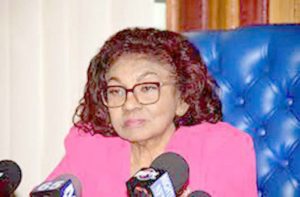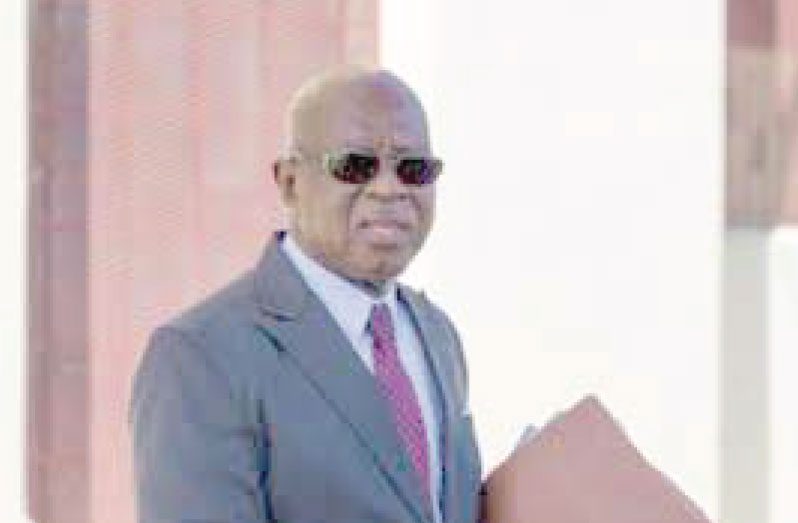…Tucville voter challenges GECOM’s decision to declare results from Recount data
…pushes for President to be sworn in, based on 10 declarations
By Svetlana Marshall
A PRIVATE citizen has moved to the High Court in an attempt to compel the Guyana Elections Commission (GECOM) to declare the results of the General and Regional Elections in accordance with the Declarations made by the 10 Returning Officers in mid-March as advised by the Chief Elections Officer, Keith Lowenfield.
Ultimately, the applicant, Misenga Jones, a registered voter from Tucville Georgetown, wants the Presidential Candidate to be deemed elected, in keeping with those declarations and the advice of the Chief Elections Officer and not on the basis of the data generated during the National Recount.

The case (Misenga Jones v The Guyana Elections Commission, Chairman of the Guyana Elections Commission, the Chief Election Officer and the Attorney-General) will be heard virtually in High Court today (July 15) at 10:00hrs before Chief Justice (ag) Roxane George-Wiltshire.
Jones, who is being presented by Attorney-at-Law Mayo Robertson, filed the Fixed Date Application on Tuesday (July 14), one day after the Chairman of GECOM, Justice (Ret’d) Claudette Singh took a decision to invalidate the 10 Declarations, in an attempt to force the hands of the Chief Elections Officer to submit an Elections Report based on the Certificates of Recount generated during the National Recount. On July 11, Lowenfield, in keeping with the Representation of the People Act, had submitted an Elections Report based on the Declarations, a move which was rejected by both the GECOM Chair and the Opposition People’s Progressive Party/Civic (PPP/C) – nominated Elections Commissioners.
Through her application, Jones is seeking a total of 21 Declarations and six Orders from the High Cour; chief among them is a declaration that Justice Singh failed to act in accordance with the advice of the Chief Elections Officer as mandated by Article 177 (2) (b) of the Constitution of Guyana, and in effect would have failed to declare the Presidential Candidate deemed to be elected as President in accordance with that advice.

Lowenfield’s July 11 Elections Report showed a win for the A Partnership for National Unity + Alliance For Change (APNU+AFC) coalition, which meant that President David Granger is in line to be elected to office for a second term, but that report has not gained the support of the GECOM Chair and the PPP/C-nominated Commissioners.
But Jones, in her application, told the Court that only the Declarations made by the Returning Officers in the 10 Electoral Districts are legal, and as such is seeking a declaration from the High Court that would confine the Chief Elections Officer, and by extension the Elections Commission to those declarations as stipulated in Section 96 of the Representation of the People Act.
As such, she asked the Court for: “A Declaration that the Chief Election Officer is not entitled to base his report required by Section 96 of the Representation of the People Act on data generated from the recount purported to be carried out under Order No. 60 of 2020. [And] A Declaration that the votes counted at the National Recount pursuant to Order No. 60 of 2020 as amended, are invalid for failure to conform with the concept of valid votes described by the CCJ in its Judgment in the Appeal of Ali and Jagdeo v David, et al [2020] 10 (AJ) GY.” Jones is of the opinion that the recount was an unconstitutional process, which encroached upon the exclusive jurisdiction of the High Court as outlined in Article 163 (1) (b) of the Constitution.

Further, in light of the decision of the Elections Commission that Lowenfield will be substituted by his deputy, should he fail to submit an Elections Report reflective of the Certificates of Recount, Jones wants the Court to declare that GECOM has no authority to declare any person as President except in accordance with the advice tendered by the Chief Elections Officer in his report pursuant to Section 96 (1) of the Representation of the People Act, and Article 177 (2) (b) of the Constitution.
Additionally, she wants the High Court to safeguard the constitutional role of the Chief Elections Officer as outlined in Article 177 (2) (b), by ruling that he is not subject to the direction of either the Chairman or GECOM, with respect to the content of the advice he is expected to provide as outlined in that Article.
In that regard, Jones has asked the High Court for: “A Declaration that letters from the Chairman of GECOM on June 13th, July 9th, and July 10th 2020 purporting to direct the Chief Elections Officer as to the content of his advice and report under Article 177(2) (b) and Section 96(1) of the Representation of the People Act respectively, are unlawful, constitutional, void, and of no effect; and a Declaration that, in particular the letter of July 9th 2020 citing Section 18 of the Election Laws (Amendment) Act No 15 of 2000 as authority that the Chief Election Officer was subject to the supervision and control of GECOM, is misguided, invalid, and has no application to the Chief Elections Officer in the performance of his duties under Article 177(2) (b) of the Constitution and Section 96(1) of the Representation of the People Act.”
Further, she asked the Court to rule that GECOM does not have the constitutional authority to alter the advice of the CEO, or the declarations of the 10 statutorily-appointed Returning Officers. To concretise the declarations being sought, Jones is asking the High Court to restrain the Elections Commission from acting contrary to Article 177 (2) (b) and Section 96 of the Representation of the People Act with respect to the advice and report of the CEO tendered on July 11, 2020.
GROUNDS FOR APPLICATIONS
In defending her Application, Jones, through her lawyer, told the Court that while the first Declaration made by Region Four Returning Officer Clairmont Mingo on March 5, 2020 was invalidated by the High Court on March 11, 2020, his second declaration made on March 13, 2020 was never invalidated by the Court.
“Applications for recounts made of the Returning Officers of several Electoral Districts were refused for varying reasons, and all Declarations were forwarded by the various Returning Officers to the Chief Elections Officer in accordance with Section 89(1) (f) of the Representation of the People Act, Chapter 1:03. Pursuant to Section 96 (2) of the Representation of the People Act, Chapter 1:03, the Chief Elections Officer, after calculating the total number of valid votes of electors which had been cast, prepared his report in accordance with Subsection 96(2) for the benefit of GECOM, and furnished GECOM with the same,” Jones detailed.
However, she noted that on March 17, 2020, the President and the Leader of the Opposition agreed to a National Recount as a result of the intervention of the then Chairman of the Caribbean Community (CARICOM). The Courts later ruled that there could not have been a CARICOM-supervised recount, and in keeping with that April decision, GECOM initiated a National Recount on May 6, 2020, using Order No. 60 as its legal cover.
But approximately one month after that recount process came to an end, the Caribbean Court of Justice (CCJ), in its July 8 judgment in the case Bharrat Jagdeo and Irfaan Ali v Eslyn David and others, stated that Order No. 60 could not create a new election regime.
“The Court further declared that validity means, and could only mean, those votes that ex facie are valid. Determination of such validity is a transparent exercise conducted in the presence of, inter alia, the duly appointed candidates and counting agents of contested parties,” Jones pointed out.
She added: “After votes were duly cast in the General and Regional Elections of 2020, votes were tabulated, and spoiled and rejected ballots were removed in the presence of counting agents and representatives of the political parties by Returning Officers, as required by Section 84 of the Representation of the People Act, and a return in writing was issued by each of the ten (10) Returning Officers, in accordance with Section 89(1)(f) of The Representation of the People Act. Based on returns received from the Returning Officers of the ten (10) Electoral Districts, the Chief Elections Officer calculated the total number of valid votes, and prepared a report as required by Section 96 of the Representation of the People Act.”
The CEO’s Election Report, Jones noted, was submitted to the Chair of GECOM on March 13, 2020, but was placed in abeyance by the Commission amid complaints against Mingo. Jones however reminded that at no time did the Court ever invalidate Mingo’s second declaration, or any of the other nine declarations made by the Returning Officers.










